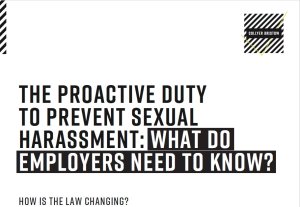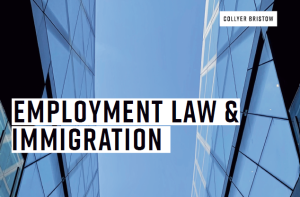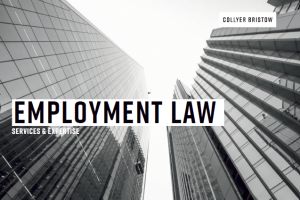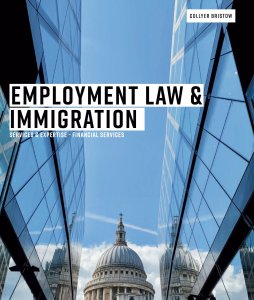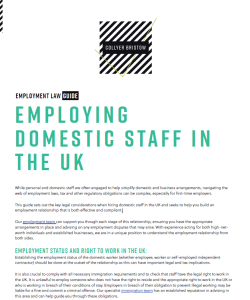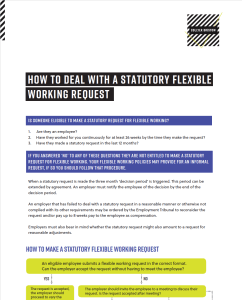
The Team
Our lawyers have the expertise and experience to provide you with creative, personalised solutions in a clear and understandable way.
Our Publications
Discover a wealth of invaluable guidance in the form of guides and brochures written by our expert lawyers.
Our insights
Discover the latest insights and thought leadership from our team of legal experts.
About
When is the reason for dismissal ‘fair’?
There are five potentially ‘fair’ reasons for terminating employment rights:
- Misconduct
- Capability e.g. poor performance or ill-health
- Redundancy
- Breach of a statutory restriction e.g. losing the right to work in the UK
- Some other substantial reason (SOSR)
If the dismissal is not for one of the five fair reasons, it is unfair. However, the final category operates as a catch-all for potentially fair dismissals that don’t fall into the other categories. There is no legal definition of dismissals that are included in this category, but it would include such matters as a personality clash that’s causing a substantial issue to the business.
Some reasons for dismissal are automatically unfair. The main examples are whistleblowing, pregnancy, and retaliation for asserting minimum pay rights.
What’s the difference between wrongful dismissal and unfair dismissal?
Wrongful dismissal is a claim for breach of contract – it does not matter if the dismissal was fair. An example might be terminating the employee’s contract immediately without observing the notice period.
Damages for wrongful dismissal usually reflect the salary and benefits the employee would have received if the contract had been properly performed. These can be substantial if there’s a long notice period.
How can I avoid unfair dismissal claims?
Even after identifying a potentially fair reason for dismissal, you must act reasonably in treating the reason as sufficient to dismiss. There are a number of elements to the reasonableness test, ranging from the fairness of the procedure you followed to the proportionality of the response. Generally, an employer is expected to follow the Acas Code of Practice on Disciplinary and Grievance Procedures as a minimum standard where fair dismissal procedure is concerned.
You can take steps to avoid an unfair dismissal claim by:
- Getting legal advice at the outset, before you take steps to dismiss an employee
- Give employees an opportunity to improve their performance
- Investigate thoroughly before taking any action
- Follow the ACAS code
- Following your own policies and procedures
- Applying processes and sanctions equally to all workers
- Negotiating a fair termination package and writing it into a settlement agreement
Our employment disputes solicitors advise businesses of all sizes about both individual and collective dismissals. We can help reduce the risk of litigation as well as reputation-tarnishing discrimination claims.
Tania GoodmanPartner - Head of Employment
+44 20 7470 4528+44 7943 827603tania.goodman@collyerbristow.com
Quick glance: publications
- Future of Work: Employment and Immigration Update Seminar Slides
- Employment Rights Bill: Emerging Trends & Considerations
- The proactive duty to prevent sexual harassment: What do employers need to know?
- Employment and Immigration Expertise
- Employment lawyers
- Employment and Immigration Expertise for Financial Services
- Advice for senior executives
- Employing domestic staff in the UK
- How to deal with a statutory flexible working request
- IR35: An overview of the changes
Unfair Dismissal Claims Publications
Future of Work: Employment and Immigration Update Seminar Slides
These slides summarise key insights from The Future of Work: A New Era – Employment and Immigration Seminar. They highlight the most significant upcoming changes in UK employment and immigration law, including the Employment Rights Bill, hybrid working practices, AI in the workplace, and Skilled Worker visa reforms. Designed for employers and HR professionals, the slides provide practical guidance on preparing for these developments, helping organisations stay compliant and strategically ready for the evolving workplace landscape.
Employment Rights Bill: Emerging Trends & Considerations
At our recent HR Conversations roundtable, we explored the key changes proposed under the Employment Rights Bill and their potential impact on employers and HR teams.
This summary outlines the current legal position, anticipated reforms, and practical steps organisations can take to prepare. Topics covered include:
Topics covered include:
- The new day-one right not to be unfairly dismissed
-
The future of fire and rehire practices
-
Evolving responsibilities around DEI and workplace culture
-
Flexible working requests and hybrid work models
-
The increasing role of AI in the workplace
Download the full summary below for insights and actionable recommendations from our Employment Law team.
The proactive duty to prevent sexual harassment: What do employers need to know?
From 26 October 2024, employers will have a new legal obligation to “take reasonable steps” to prevent sexual harassment. Here we explain how the law is changing, sanctions for non-compliance and what you can be doing now to prepare for the new duty in the run-up to October and beyond.
Employment and Immigration Expertise
An overview of our Employment and Immigration services.
Employment lawyers
An overview of our Employment services. Our Employment Lawyers work closely with many types of clients across a wide range of sectors providing advice on a variety of issues, whether they are HR-related, strategic, complex or contentious.
Employment and Immigration Expertise for Financial Services
An overview of our Employment and Immigration services within the financial services sector.
Advice for senior executives
Conflicts at work can be distressing and daunting for a variety of reasons and trying to deal with them on your own is difficult. We can help to clarify the situation for you by providing clear, practical and confidential guidance.
Employing domestic staff in the UK
This guide sets out the key legal considerations when hiring domestic staff in the UK and seeks to help you build an employment relationship that is both effective and compliant.
How to deal with a statutory flexible working request
Collyer Bristow’s Employment team has prepared a useful step-by-step flowchart for employers, guiding them through the complex process of dealing with a statutory flexible working request from an employee.
IR35: An overview of the changes
An overview of the IR35 tax rules now extending to the private sector. For affected contractors and businesses using their services, there are now significant tax and practical consequences.
Unfair Dismissal Claims insights
News
Employment Rights Bill – Touchdown: Uncapped Risks AheadEmployment Rights Bill – Touchdown: Uncapped Risks Ahead
Read more
Longer Reads
Future of Work: Key Updates – Employment and Immigration Seminar SummaryFuture of Work: Key Updates – Employment and Immigration Seminar Summary
Read more
Shorter Reads
How a slow burning legal battle could cost UK supermarkets millionsHow a slow burning legal battle could cost UK supermarkets millions
Read more
Shorter Reads
Qantas fined £43m for illegal layoffsQantas fined £43m for illegal layoffs
Read more
Shorter Reads
Third of UK firms deploy ‘bossware’ to track staff activity, survey revealsThird of UK firms deploy ‘bossware’ to track staff activity, survey reveals
Read more
News
Collyer Bristow strengthens offering to businesses with Employment Partner hireCollyer Bristow strengthens offering to businesses with Employment Partner hire
Read more
Shorter Reads
Changes to the Employment Rights Bill: What do you need to know?Changes to the Employment Rights Bill: What do you need to know?
Read more
Shorter Reads
Proposed Timeline for Employment Law ReformProposed Timeline for Employment Law Reform
Read more
Shorter Reads
Government review of parental leave regimeGovernment review of parental leave regime
Read more
Shorter Reads
HSBC’s Office Mandate: The Legal Implications of Reversing Remote Working TrendsHSBC’s Office Mandate: The Legal Implications of Reversing Remote Working Trends
Read more
Shorter Reads
Restaurant fallout: How should organisations handle public scrutiny?Restaurant fallout: How should organisations handle public scrutiny?
Read more
Shorter Reads
Ensuring confidentiality of sensitive data in the workplaceEnsuring confidentiality of sensitive data in the workplace
Read more
You might also like
Need some more information? Make an enquiry below
Unfair Dismissal Claims key contacts
- Tania
GoodmanPartner - Head of Employment
Talk to Tania about Employment law for employees and Employment law for employers
Unfair Dismissal Claims
Help reduce the risk of litigation as well as reputation-tarnishing discrimination claims
Employees with more than two years’ service have protection against unfair dismissal and can file a complaint with the Employment Tribunal if they are dismissed for potentially illegitimate reasons. Unfair dismissal compensation can be up to a year’s gross pay, so it’s essential for employers to get it right. Our employment disputes solicitors advise businesses of all sizes about both individual and collective dismissals. We can help reduce the risk of litigation as well as reputation-tarnishing discrimination claims.
The Team
Our lawyers have the expertise and experience to provide you with creative, personalised solutions in a clear and understandable way.
Our Publications
Discover a wealth of invaluable guidance in the form of guides and brochures written by our expert lawyers.
Our insights
Discover the latest insights and thought leadership from our team of legal experts.
When is the reason for dismissal ‘fair’?
There are five potentially ‘fair’ reasons for terminating employment rights:
- Misconduct
- Capability e.g. poor performance or ill-health
- Redundancy
- Breach of a statutory restriction e.g. losing the right to work in the UK
- Some other substantial reason (SOSR)
If the dismissal is not for one of the five fair reasons, it is unfair. However, the final category operates as a catch-all for potentially fair dismissals that don’t fall into the other categories. There is no legal definition of dismissals that are included in this category, but it would include such matters as a personality clash that’s causing a substantial issue to the business.
Some reasons for dismissal are automatically unfair. The main examples are whistleblowing, pregnancy, and retaliation for asserting minimum pay rights.
What’s the difference between wrongful dismissal and unfair dismissal?
Wrongful dismissal is a claim for breach of contract – it does not matter if the dismissal was fair. An example might be terminating the employee’s contract immediately without observing the notice period.
Damages for wrongful dismissal usually reflect the salary and benefits the employee would have received if the contract had been properly performed. These can be substantial if there’s a long notice period.
How can I avoid unfair dismissal claims?
Even after identifying a potentially fair reason for dismissal, you must act reasonably in treating the reason as sufficient to dismiss. There are a number of elements to the reasonableness test, ranging from the fairness of the procedure you followed to the proportionality of the response. Generally, an employer is expected to follow the Acas Code of Practice on Disciplinary and Grievance Procedures as a minimum standard where fair dismissal procedure is concerned.
You can take steps to avoid an unfair dismissal claim by:
- Getting legal advice at the outset, before you take steps to dismiss an employee
- Give employees an opportunity to improve their performance
- Investigate thoroughly before taking any action
- Follow the ACAS code
- Following your own policies and procedures
- Applying processes and sanctions equally to all workers
- Negotiating a fair termination package and writing it into a settlement agreement
Our employment disputes solicitors advise businesses of all sizes about both individual and collective dismissals. We can help reduce the risk of litigation as well as reputation-tarnishing discrimination claims.
Tania GoodmanPartner - Head of Employment
View Tania Goodman's profileAbbie ArmstrongAssociate
View Abbie Armstrong's profileAndrew GrangerPartner
View Andrew Granger's profileKaren MortensonPartner
View Karen Mortenson's profileSinead KellySenior Associate
View Sinead Kelly's profileUnfair Dismissal Claims Publications
- Future of Work: Employment and Immigration Update Seminar Slides
- Employment Rights Bill: Emerging Trends & Considerations
- The proactive duty to prevent sexual harassment: What do employers need to know?
- Employment and Immigration Expertise
- Employment lawyers
- Employment and Immigration Expertise for Financial Services
- Advice for senior executives
- Employing domestic staff in the UK
- How to deal with a statutory flexible working request
- IR35: An overview of the changes
Unfair Dismissal Claims insights
News
Employment Rights Bill – Touchdown: Uncapped Risks AheadEmployment Rights Bill – Touchdown: Uncapped Risks Ahead
Read more
Longer Reads
Future of Work: Key Updates – Employment and Immigration Seminar SummaryFuture of Work: Key Updates – Employment and Immigration Seminar Summary
Read more
Shorter Reads
How a slow burning legal battle could cost UK supermarkets millionsHow a slow burning legal battle could cost UK supermarkets millions
Read more
Shorter Reads
Qantas fined £43m for illegal layoffsQantas fined £43m for illegal layoffs
Read more
Shorter Reads
Third of UK firms deploy ‘bossware’ to track staff activity, survey revealsThird of UK firms deploy ‘bossware’ to track staff activity, survey reveals
Read more
News
Collyer Bristow strengthens offering to businesses with Employment Partner hireCollyer Bristow strengthens offering to businesses with Employment Partner hire
Read more
Shorter Reads
Changes to the Employment Rights Bill: What do you need to know?Changes to the Employment Rights Bill: What do you need to know?
Read more
Shorter Reads
Proposed Timeline for Employment Law ReformProposed Timeline for Employment Law Reform
Read more
Shorter Reads
Government review of parental leave regimeGovernment review of parental leave regime
Read more
Shorter Reads
HSBC’s Office Mandate: The Legal Implications of Reversing Remote Working TrendsHSBC’s Office Mandate: The Legal Implications of Reversing Remote Working Trends
Read more
Shorter Reads
Restaurant fallout: How should organisations handle public scrutiny?Restaurant fallout: How should organisations handle public scrutiny?
Read more
Shorter Reads
Ensuring confidentiality of sensitive data in the workplaceEnsuring confidentiality of sensitive data in the workplace
Read more
Need some more information? Make an enquiry below.
Message us on WhatsApp (calling not available)
Please note that Collyer Bristow provides this service during office hours for general information and enquiries only and that no legal or other professional advice will be provided over the WhatsApp platform. Please also note that if you choose to use this platform your personal data is likely to be processed outside the UK and EEA, including in the US. Appropriate legal or other professional opinion should be taken before taking or omitting to take any action in respect of any specific problem. Collyer Bristow LLP accepts no liability for any loss or damage which may arise from reliance on information provided. All information will be deleted immediately upon completion of a conversation.
Close



